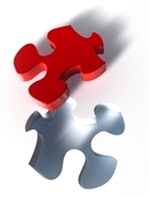NLP
the study of success
NLP was originated by John Grinder and Richard Bandler for the purpose of making explicit models of human excellence.
"NLP is an attitude which is an
insatiable curiosity about human beings with a methodology that leaves
behind it a trail of techniques."
Richard Bandler
"The strategies, tools and techniques of NLP represent an opportunity unlike any other for the exploration of human functioning, or more precisely, that rare and valuable subset of human functioning known as genius." John Grinder
NLP
Neuro
Linguistic
Programming
Neuro refers to how the mind and body interact
Linguistic refers to the insights into our thinking that can be obtained by careful attention to our use of language
Programming refers to the study of the thinking and behavioural patterns or ‘programmes’ which we use in our daily lives.

What is NLP?
NLP has been variously described as the technology of the
mind, the
science of achievement, and the study of success. It is based upon the
search for, and the study of, the factors which account for either
success or failure in human performance.
For over thirty
years NLP explorers have studied or ‘modelled’ the behaviour and
thinking styles of particularly effective and successful people in
business, education, sales, therapy, sport, and personal development.
NLP is about competence and excellence and also about wisdom and vision. It is a way of enriching the choices that you have and perceive as available in the world around you. Excellence comes from having many choices. Wisdom comes from having multiple perspectives.
Using NLP may open up your thinking so you may gain insights into achieving even more focus, self esteem, power to make good decisions, direction, self confidence, less procrastination and faster progress.
NLP has inspired a wealth of useful techniques to help us to detox our thinking, achieve personal mastery, dissolve obstacles, attain clarity and reach our goals.
NLP describes the fundamental dynamics between mind (neuro) and language (linguistic) and how their interplay effects our behaviour (programming).
Neuro: Your sensory experience. Each individual absorbs information through their five senses and form a sensory-based map of the outside world, consisting of images, sounds, tactile awareness, internal sensations and tastes and smells.
Linguistic: We
label what we see, hear, feel, taste and smell by comparing immediate
sensory experience with our internal maps. Our internal maps consist of
recalled data e.g. images, sounds, internal sensations, tastes and
smells. We assign personal meaning by labelling it through language.
Programming: The
behavioural output that occurs as a result of what has been received
through the five senses (neurological processes).

